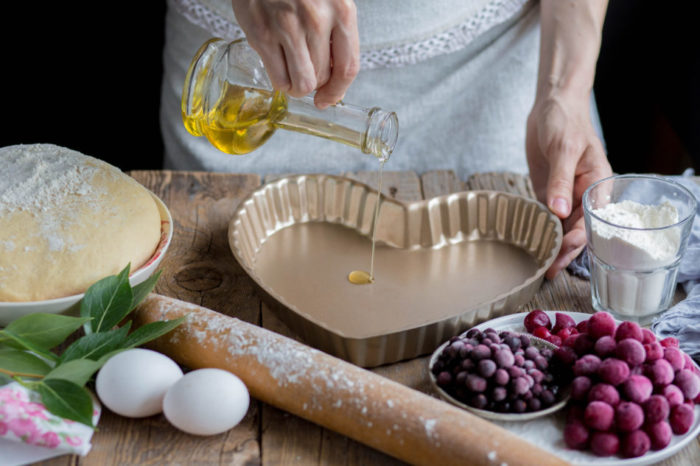
Vegetable oil is a remarkably versatile and useful cooking ingredient. It has great uses in frying and cooking. It’s also an excellent ingredient in baking, especially for cakes.
Popular and common as it is, there will be occasions when you want vegetable oil substitutes for your recipe and cooking needs.
Let’s get started and see what replacements are available and how they work.
Vegetable Oil Substitutes For Cakes And Baking
1. Butter
A key role for vegetable oil in baking is to provide the fat necessary for the food. As such, many of its replacements and substitutes take on a similar role.
Butter is an excellent substitute for vegetable oil in cakes. Use unsalted butter to get an excellent dose of flavor and substance to the cake.
The use of butter will cause a change in taste, which might actually be for the better if you prefer your cakes buttery. If you so prefer, go for butter with higher fat content for a deeper flavor and better texture.
Generally, using butter in place of vegetable oil will result in a cake that’s fluffier and rises better. It usually works better than most oil-based substitutes.
2. Olive Oil
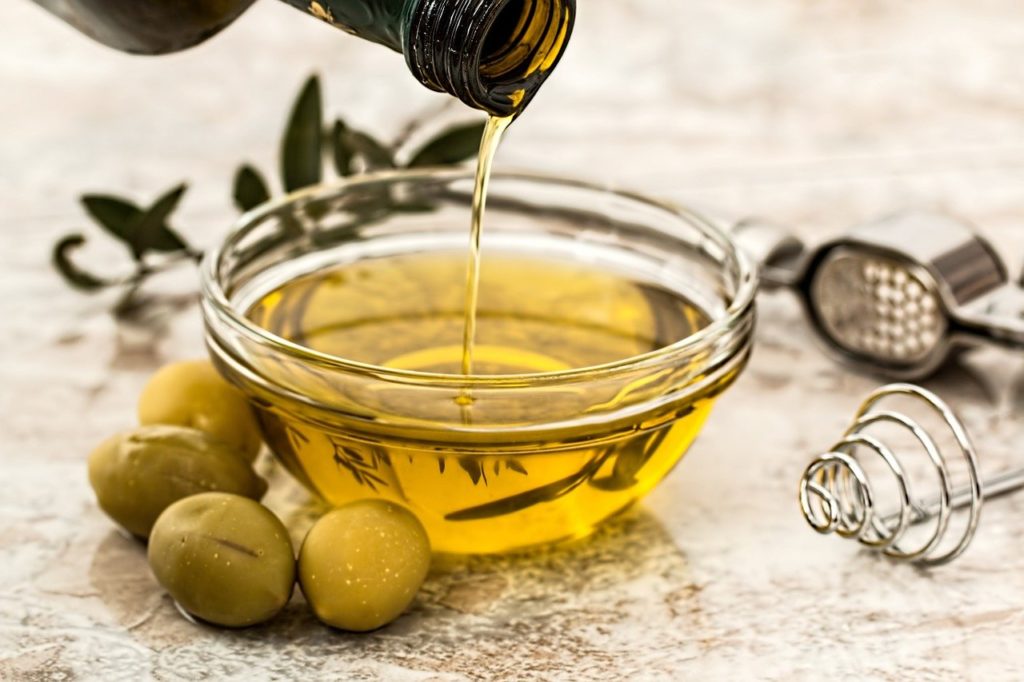
Olive oil is a good substitute for vegetable oil in several recipes and applications. You can use it for baking, dressing salads, cooking, and some sauteing. It’s not suitable for frying because olive oil has a relatively low smoke point and that can be a problem.
When using olive oil for baking, remember that it will add a rather distinct, and sometimes strong flavor to the food. It can add a strong floral touch to the cake or baking, so be careful when choosing olive oil as a substitute for the more neutral-tasting vegetable oil.
When using olive oil as a replacement, you can use it in the same proportion and amount as vegetable oil for the recipe.
3. Coconut Oil
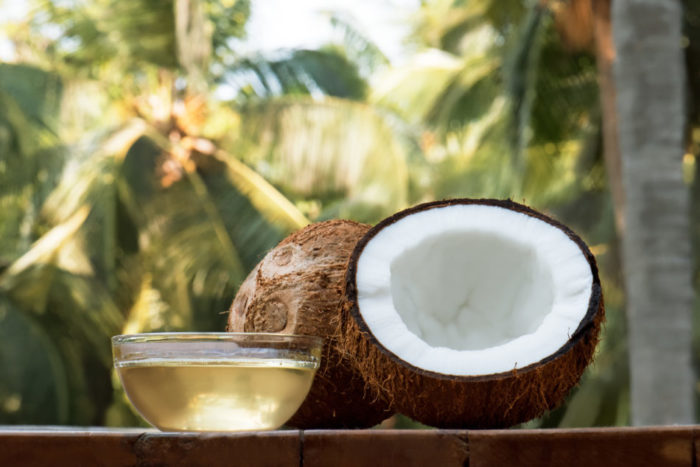
Here’s another hot favorite for many foods and dishes. Coconut oil will replace vegetable oil without a problem. It will, however, add its own distinct flavor and taste to the recipe. Personally, I enjoy the touch of coconut flavor and love it.
However, it’s not always such an easy choice, so keep the replacement and substitution requirements in mind when using this substitution. Although, I should point out, it won’t bring a strong coconut flavor. Rather, it’s fairly mild and enjoyable.
It’s possible to use coconut oil in the same proportions and amount as vegetable oil when making cake or other baked goods.
4. Ghee
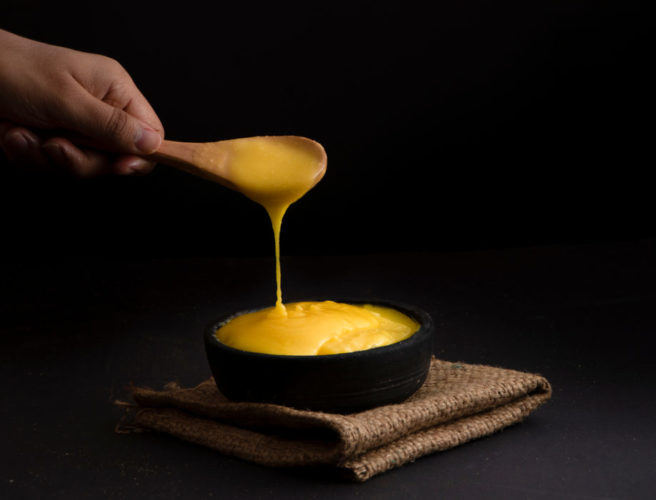
Very popular in India, ghee is a fat derived from milk or butter. Its flavor has notes of a nutty taste, though it’s not very strong. Ghee is useful for several purposes, including sauteing, frying, and baking. You could use it for baking cake, though remember to account for the possible change in flavor.
5. Mayonnaise
Mayonnaise is an interesting choice. While it can work as a substitute for vegetable oil in cooking, it needs to be picked rather carefully. Pick mayonnaise that’s unflavored and tasteless (or with a neutral taste). Any other pick will not go as well with baking food.
In a crude way, mayonnaise is a combination of eggs and oil. As such, its base ingredients are very much suited for use in baking!
However, while its constituent ingredients individually work well for baking, mayonnaise demands more attention. It cannot be diluted, so you’ll need to be more attentive about texture and use. Conventionally, about ¾ cup of mayonnaise is a good substitute for a cup of vegetable oil.
6. Black Beans
Here’s a surprisingly good substitute for vegetable oil – black beans! These beans have a rich, creamy texture that can work with your baking needs. It’s a good idea to soak the beans for a while (or overnight), drain the water, and then blend the beans.
This will give you a nice and creamy mix that will go wonderfully with most cakes. However, in its current form, this option lacks a very important ingredient: fat.
It’s possible to get around this problem by adding an equal amount of yogurt to the beans when blending them. This combination is a great way to add some fat and texture to the cake.
There’s another aspect too. Black beans are noticeably black. Adding them to the recipe will change the color of the cake. Expect it to go darker. Another point is that this substitute or combination is more difficult to pull off than other options.
7. Bananas
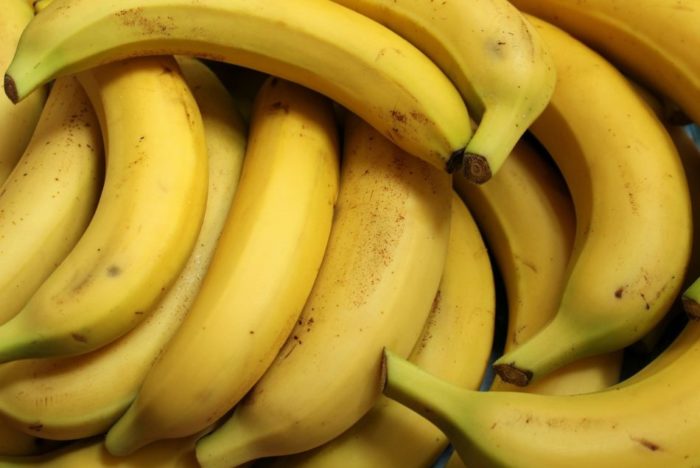
Using bananas, or rather, banana puree is a suitable alternative to vegetable oil in baking. The process is simple enough, all you have to do is smush some bananas and use them in place of the vegetable oil.
Bananas are fairly rich in fat, so the replacement works acceptably well. Plus, bananas also bring moistness, so the baked goods benefit more. While they are a good replacement for vegetable oil in food, bananas are also widely used in vegan recipes as substitutes for eggs in brownies and other baked goods.
8. Fruit Puree
Fruit puree is a useful pick when you want a quick and easy substitute. In a general sense, this would also include bananas and apples mentioned on this list. However, both these options are popular and tested and therefore deserve their specific positions.
Technically, you could use any fruit and blend it to make a good puree. This would add the necessary fat and moistness to the cake for baking. When going with this option, remember that the flavor and color of the fruit will affect the overall flavor and color of the cake too.
As such, preference is usually given to fruits with a milder flavor and color. Pumpkins are a good choice, though the entire range of options remains available if you’re willing to use it.
9. Applesauce
Applesauce is seen as a generic replacement for fat content in baked goods. Obviously, this also includes substitution for vegetable oil. When choosing applesauce, prefer one that doesn’t include preservatives and similar substances.
Commercially available applesauce may contain added sugar. This isn’t a problem, but remember to adjust the sweetness of the recipe to accommodate this added sugar.
Applesauce is an interesting and easily available alternative to vegetable oil in baking. It’s fairly versatile and makes a good ingredient for baked goods.
10. Dairy Products
Several dairy products contain a fair amount of fat and just enough moisture to get the baking job done. Generally, the best practice is to avoid overly watery options that have low fat. However, those with a good fat content and some moisture are useful as substitutions for vegetable oil.
Some worthwhile options include yogurt, buttermilk, and a few types of cheese. Some cream could also work in this scenario. This isn’t an ideal option, though it is fairly useful if you’re in need of a quick substitution.
11. Dried Plums
You can make good use of dried plums for flavor in you baked goods, as well as a replacement for vegetable oil. Plums, especially dried plums, have an inherent sweetness and will also bring their own flavor and color to the recipe. Dried plums work better than fresh plums because of their lower water content and lower tartness.
For most substitutions, using half to three-fourths cup of dried plums should be enough to replace a cup of vegetable oil.
Best Substitutes For Vegetable Oil In Cooking And Frying
1. Canola Oil
As frying, cooking, and sauteing go, canola oil is an excellent substitution for vegetable oil. With a smoke point of 400°F, it is quite similar to vegetable oil in handling heat. Also, canola oil has a neutral flavor and won’t change the taste of the recipe being cooked.
The substitution is direct. You can replace vegetable oil with an equal amount of canola oil.
2. Grapeseed Oil
The light green color of grapeseed oil looks inviting enough. Thankfully, its color is strongly backed by its good culinary properties. This oil has a smoke point at 420°F, which is slightly higher than vegetable oil at 400°F.
Grapeseed oil maintains a clean flavor and mixes well with other ingredients and foods. It’s a great pick for must culinary uses and is a competent replacement for vegetable oil.
3. Sunflower Oil
As another, fairly popular cooking oil, sunflower oil deserves attention as a good substitute to vegetable oil. With the smoke point at 450°F, sunflower oil does better at managing heat compared to the other options. This oil does have a slight flavor, but it isn’t problematic and sunflower oil is a popular cooking oil used throughout the world.
FAQ
Can You Use Olive Oil Instead of Vegetable Oil In Cake?
Olive oil is a decent substitute for vegetable oil in baking and making cakes. It is possible to use vegetable oil instead of olive oil in an equal (1:1) ratio for baking needs.
There is a small hitch in this substitution. While vegetable oil is neutral and doesn’t much affect the taste of the recipe, olive oil can add a strong floral touch in baking cakes.
Can I Substitute Canola Oil For Vegetable Oil?
Canola oil can replace vegetable oil for almost all culinary applications. These include baking, cooking, frying, and others. There will be a slight variation in taste, but that is unlikely to be a problem.
It’s worth remembering that canola oil is a vegetable oil. In fact, commercially available vegetable oil is a blend of several oils. Usually, the biggest portion is soybean oil, though it contains a significant amount of canola oil as well.
As such, canola oil is a good substitute for vegetable oil and can handle most of its responsibilities in cooking.
Can I Substitute Butter For Vegetable Oil?
Butter is a good substitute for vegetable oil, especially for some baking needs. Using butter might improve the flavor and overall texture of the recipe.
In fact, butter is often used in many recipes, so it shouldn’t be a problem to use it in place of vegetable oil. Keep in mind, the butter you use should be unsalted and preferably without preservatives or similar additions.
Can You Substitute Coconut Oil For Vegetable Oil?
Coconut is a good substitute for vegetable oil and can be useful for several recipes, including baking cakes. However, it has a low smoke point at 350°F and therefore, might not be useful for frying and similar applications.
When using coconut oil in baking, you may have to melt it first as the oil is a solid at normal room temperature. It’s also important to remember that coconut oil has a strong flavor of its own, which will eventually impact the taste and flavor of the recipe.
Conclusion
Versatile and useful as vegetable oil is, it isn’t exactly irreplaceable for its cooking and baking needs. As we see here, there are several competent and useful vegetable oil substitutes that you can use for your recipes.
Do keep in mind that all of these substitutes aren’t always suitable and many of them have specific uses. For example, while applesauce is an excellent substitute for vegetable oil in baking, it has no use in frying or sauteing.